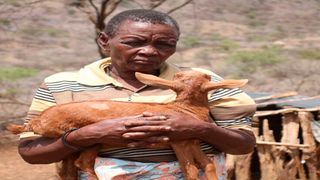
Jennifer Chesaro holds the only goat she was left with following a raid by armed bandits at her homestead in Kagir village in Baringo North on January 18.
| Florah Koech | Nation Media GroupCounties
Premium
Hint of desperation in calls to end killings in North Rift
What you need to know:
- Nineteen people have been killed since last December and over 5,000 livestock stolen.
- On Saturday, bandits made away with more than 100 goats in Lokeke village.
Just what will it take to silence the guns and end the killings in the restive North Rift region?
This is the question that is troubling the minds of desperate leaders, who are at a loss on what to do as the fighting continues to claim lives, displace thousands and destroy livelihoods.
On Saturday, bandits made away with more than 100 goats belonging to Komole Lopetangole in Lokeke village in West Pokot County.
This was reportedly a retaliatory attack after the theft of 70 goats in Kainuk in Turkana South Sub-county.
The search for peace in North Rift remains elusive despite several measures being put in place to contain the violence.
Turkana County Commissioner Boniface Wambua has even issued a shoot-to-kill order against armed bandits.
The violence that has hit the Turkwel Belt on the West Pokot-Turkana border has forced thousands to flee their homes amid outrage from local leaders, who are demanding that urgent action be taken.
A spot-check by the Nation revealed that families are camping in Orwa, Lous, Kambi Karai, Sarmach Nasolot and Marich.
Persistent insecurity
West Pokot Governor John Lonyangapuo, who on Sunday visited the affected families and distributed foodstuff, called for peaceful co-existence in the region.
He urged residents to go back to their homes, assuring them of their security.
“Police have intensified patrols,”he said, and urged the national government to speed up the identification and vetting of national police reservists as agreed during a recent security meeting in Nakuru.
Turkana County gubernatorial hopeful John Munyes, who is the former Petroleum cabinet secretary, condemned the killings and urged leaders in Turkana, Baringo and West Pokot counties to help end the attacks.
“The trend is worrying. We are calling upon the government to fulfil its promise of overhauling the security team,” he told journalists at his home in Trans Nzoia County.
Turkana Governor Josphat Nanok said 19 people have been killed in separate attacks since last December, with more than 5,000 livestock stolen.
He said in a statement that six people were killed and over 300 livestock stolen on January 31 in Kaakulit, Kamunge and Napeitom in Turkana East.
“These reports reveal a deteriorating security situation. As an immediate response, my administration is collaborating with national security agencies to evacuate locals from the affected areas,” Mr Nanok said.
Frequent clashes
Some leaders blame the violence on the proliferation of small weapons in the country, which, they say, is a spillover effect from the ongoing fighting in South Sudan.
They want the government to increase patrols on the porous Kenya-South Sudan border.
Turkana North MP Christopher Nakuleu lamented the frequent clashes between Turkana pastoralists and groups from Ethiopia and South Sudan.
Hundreds of Merille and Nyangatom herdsmen from Ethiopia, he said, have invaded parts of Kibish Sub-county in search of pasture and water for their animals, triggering armed conflicts.
The Ethiopians are being pushed southwards as their government takes control of vast swathes of rangeland to convert to agricultural land.
According to the New York-based Human Rights Watch, about 100,000 hectares in Lower Omo Valley has been earmarked for the cultivation of sugarcane and cotton. The Ethiopian government has termed the project an agricultural revolution.
A senior government official in South Omo Zone said the land will be put under irrigation.
The official further disclosed that some members of the Merrile community have abandoned pastoralism and embraced agricultural production, which they consider to be more lucrative. They grow maize, sorghum, millet, rice and fruits.
Cattle rustling
Speaking at Kambi Karaya yesterday, Governor Lonyangapuo revealed that his administration was holding discussions with officials from Turkana County to ensure peace prevails in the region.
He urged the national government to beef up security and end the cattle rustling menace, saying, schools have been closed because of the fighting.
“We urge other leaders to join us; let us all come together so that we can end the escalating violence,” he said.
Mr Peter Tepakwang, a resident from Orwa, called upon the national government to establish a police station at Lami Nyeusi.
Mr Tempakwang lamented that, on top of the deteriorating state of security in the region, residents are also facing hunger.
“There is neither water nor food and women, children and the elderly are suffering,” he said.
A local from Kambi Karaya, Mr Rami Resi, said, his wife went missing while his livestock were stolen during a recent raid.
“I have not found my wife since the attack. We have been friends with Kainuk people [who are now fighting us],” he said. “We had 220 children in Lami Nyeusi Primary School but it has since been closed,” Mr Resi added.
Reporting by Gerald Bwisa, Bernabas Bii and Oscar Kakai





